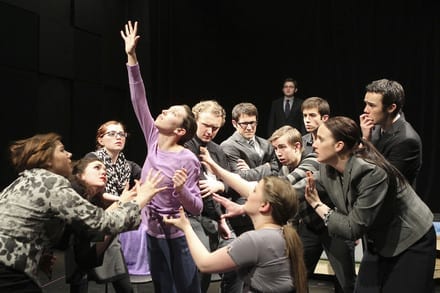OGDEN — Art, in all its forms, provides an opportunity for the audience to step into another’s shoes. Although every artistic medium allows the audience to examine the artist’s point of view, in theatre the audience has the chance to experience life through a character on stage. For example, I do not have Autism. I can Google that disorder and learn about it, but until I really see the symptoms and the world of the autistic, I will not truly understand. Shows like Mockingbird give the audience a limited peek into the world of a girl with Asperger’s Syndrome, a milder form of Autism. This girl, named Caitlin, struggles at her elementary school and with human interaction in general. Her brother has just passed away as well, so the play shows Caitlin dealing with a lot of uncomfortable situations. In the theater at Weber State University, I was witness to an intimate performance by lead actress Camrey Bagley, a clever and insightful script by Julie Jensen, and director Tracy Callahan’s powerful staging/choreography as they told Caitlin’s story.

Camrey Bagley played Caitlin with such detail and commitment that, after the first minute or two, I did not think of her as an actor. I never questioned her authenticity. Bagley spoke deliberately, each word clearly pronounced, and made it clear that Caitlin interpreted speech literally. Bagley had obviously put thought and practice into her physical presence, as well. Her walk, her hands and feet, the tilt of her head, and her facial expressions all felt authentic. I imagine that it was an exhausting role to play. Bagley’s happiness was monumental when Caitlin impressed the little kids with her alphabet burping, and when Michael (Colton Ward) became her friend she looked elated. Alternately, there was a confused sadness in Bagley’s eyes during those times when she was so alone; most of the time no one understood or accepted the way she was—not her teachers, nor her dad. Bagley’s acting drew me in; I wanted so badly for her to succeed.
As an audience member, I felt Caitlin’s confusion and anxiety very strongly, both from Camrey Bagley’s portrayal of Caitlin and from the symbolic stage directions by Tracy Callahan. The ensemble often surrounded Bagley or leaned into her personal space, which showed how intrusive and intimidating people can seem to a child with Asperger’s. Callahan also used movements, like bending or moving arms in strange patterns. I couldn’t understand all the movements, but maybe that was the point: I can’t completely understand the way Caitlin sees things. Callahan kept Bagley always onstage, and she drastically distinguished each group of characters through their movements and speech, like adults, peers, little kids, and teachers. I do wish Caitlin’s dad, played by Connor Padilla, had seemed sad during his grieving, but not distant. For the first half of the play, his blocking and acting created the impression that he was unfamiliar with Caitlin, as if he hadn’t been raising her for years.

Julie Jensen’s script was based on the book by Kathryn Erskine. Mockingbird had a great balance of emotions and some lines that I really loved. Some interesting things I noticed were, first, that no one ever said “Autism” or “Asperger’s.” Second, the script never mentions where Caitlin’s mom is, even briefly; these items aren’t necessarily problems, I just find it worth noting. Jensen made Caitlin very literal, and therefore always honest. Caitlin must then learn that lying is actual more accepted in some situations, like with a teacher. I liked the line, “I can do a better group project by myself.” There are many times when common figures of speech are translated into more literal terms for Caitlin, like when she has to think of “uncomfortable” in physical terms instead of emotional. Jensen created a lot of humor through Caitlin; she offers friend Michael a gummy worm, “Her name is Shannon,” she tells him. Therapy-speak like, “Let’s talk about that,” drives Caitlin nuts. One time, rather than calling her “freak,” the mean boy Josh (Dylan Padilla) says that she is like a dog, because she drools; Caitlin is glad to be called a dog, because dogs are nice and lay their heads on your lap. Lines like those made Caitlin so endearing.
I’m glad that messages like those in Mockingbird are being presented in the Utah theater community. When plays are presented in such a professional manner, with talented actors and creative directing, the content of the script is allowed to truly reach the audience. We are truly able to see through someone else’s eyes.
[box type=”shadow”]Mockingbird plays at the Eccles Theatre in the Val A. Browning Center for the Performing Arts through April 5. Unfortunately, the play is sold out for the remainder of its run at Weber State University. This script will next be performed at The John F. Kennedy Center for the Performing Arts, and Tracy Callahan has been invited to direct. For more information, visit http://www.weber.edu/WSUImages/performingarts/documents/THEA.pdf.[/box]

